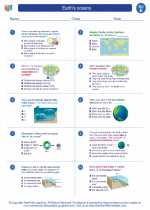Mountain
A mountain is a large landform that rises above the surrounding land in a limited area, usually in the form of a peak. Mountains are formed through tectonic forces or volcanic activity. They are found on every continent and in every kind of climate. Mountains play a crucial role in the water cycle, as they capture moisture from the air and release it as precipitation, making them the source of many of the world's major rivers.
Formation of Mountains
Mountains are formed through tectonic forces, which can result in the uplift of the Earth's crust. This can happen through the collision of tectonic plates, the movement of the Earth's crust, or volcanic activity.
Types of Mountains
There are several types of mountains, including fold mountains, block mountains, dome mountains, and volcanic mountains. Each type is formed through different geological processes.
Mountain Ecosystems
Mountain ecosystems are unique and diverse, with a wide variety of plant and animal species adapted to the harsh conditions found at high altitudes. These ecosystems are often fragile and vulnerable to human impact.
Human Interaction with Mountains
Mountains have been home to human communities for thousands of years, and they provide valuable resources such as water, timber, and minerals. However, human activities such as mining, deforestation, and tourism can also have negative impacts on mountain ecosystems.
Study Guide
- What is a mountain and how is it formed?
- Explain the different types of mountains.
- Describe the unique characteristics of mountain ecosystems.
- Discuss the impact of human activities on mountain environments.
[Mountain] Related Worksheets and Study Guides:
.◂Science Worksheets and Study Guides Fifth Grade. Earth's oceans

 Worksheet/Answer key
Worksheet/Answer key
 Worksheet/Answer key
Worksheet/Answer key
 Worksheet/Answer key
Worksheet/Answer key
 Vocabulary/Answer key
Vocabulary/Answer key
 Vocabulary/Answer key
Vocabulary/Answer key
